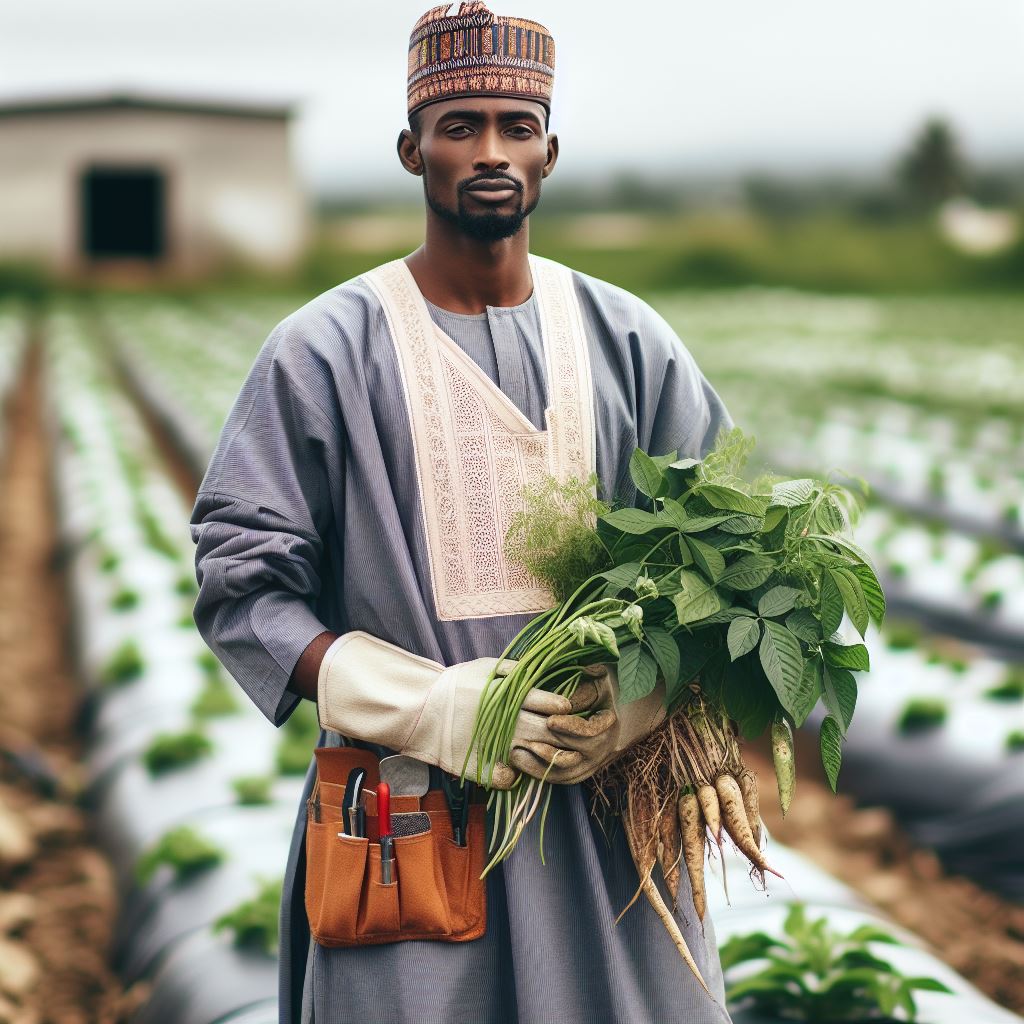Introduction
This blog post will explore Agri Economics Role in the African Continental Landscape.
Nigeria, often referred to as the “Giant of Africa,” boasts a vibrant agricultural sector that serves as a cornerstone of its economy.
This sector is multifaceted, encompassing various agricultural activities that form the backbone of the nation’s livelihoods and economic stability.
In Nigeria, agriculture represents a vital economic pillar, contributing substantially to the Gross Domestic Product (GDP) and employment generation across rural areas.
The sector engages millions, directly and indirectly, providing jobs and income for a significant portion of the population.
Moreover, agriculture in Nigeria addresses critical issues of food security, ensuring a stable supply of food within the nation’s borders.
The purpose of this blog is to delve into the intricacies of Nigeria’s agricultural landscape, highlighting its significance within the broader African continental scope.
By exploring the sector’s dynamics, challenges, and advancements, we aim to underline Nigeria’s influence and potential impact on the agricultural developments within the African continent.
Throughout this blog series, we will unravel the diverse agricultural practices, technological innovations, and governmental policies shaping Nigeria’s agricultural narrative.
From the cultivation of staple crops like cassava and maize to the burgeoning livestock and fisheries sectors, each facet contributes uniquely to Nigeria’s agricultural prowess.
Ultimately, this exploration aims to shed light on the pivotal role Nigeria plays in driving agricultural growth and innovation within Africa.
As we unravel the complexities of Nigeria’s agri-economics, we will uncover the potential for collaborative initiatives and cross-border partnerships to further bolster agricultural development across the continent.
Historical Context of Agriculture in Nigeria
Traditional farming practices in Nigeria
Nigeria’s agriculture has a rich history, with traditional farming practices dating back centuries.
Traditional methods involve small-scale farming, subsistence agriculture, and reliance on manual labor.
Farmers cultivate crops like yam, maize, millet, and sorghum using rudimentary tools.
Traditional farming practices are deeply rooted in cultural and communal traditions that have sustained rural communities.
Introduction of modern agricultural techniques
With the advent of colonial rule, Nigeria witnessed the introduction of modern agricultural techniques.
The British colonial government promoted cash crops, such as cocoa, palm oil, and rubber, for export.
The introduction of cash crops led to the displacement of traditional subsistence farming practices.
Modern techniques in agriculture included the use of farm machinery, chemical fertilizers, and improved irrigation systems.
Evolution of Nigeria’s agricultural sector over time
After gaining independence in 1960, Nigeria focused on agricultural development as a means of economic growth.
The government launched numerous agricultural policies and programs to boost productivity and self-sufficiency.
In the 1970s, the oil boom led to a neglect of the agricultural sector, as Nigeria became heavily dependent on oil revenues.
This dependency on oil resulted in a decline in agricultural production and a loss of food security.
In recent years, there has been a renewed focus on revitalizing Nigeria’s agricultural sector.
The government has implemented various initiatives to promote modern farming techniques, increase productivity, and reduce food imports.
The Agricultural Transformation Agenda and the Green Alternative are examples of policies aimed at transforming the sector.
Additionally, investments in research and development, infrastructure, and market access have been prioritized.
Nigeria’s agricultural sector has the potential to contribute significantly to the overall African continental landscape.
With its vast arable land, diverse agro-ecological zones, and a large labor force, Nigeria can become an agricultural powerhouse.
The country’s agricultural exports, such as cocoa, palm oil, and sesame seeds, can contribute to Africa’s economic growth.
Furthermore, increased agricultural productivity in Nigeria can help alleviate poverty, create employment opportunities, and enhance food security.
In essence, Nigeria’s agricultural sector has undergone significant changes over time.
From traditional farming practices to the introduction of modern techniques, the sector has evolved.
The country’s agricultural history is intertwined with its socio-political context, including colonial influences and economic factors.
However, there is now a renewed focus on revitalizing the sector for sustainable growth and development.
Nigeria has the potential to play a crucial role in the African continental landscape through its agricultural contributions.
By investing in modern technologies, infrastructure, and market access, Nigeria can transform its agricultural sector and reap the benefits of increased productivity and food security.
Read: The Interplay of Climate Change & Agricultural Economics in Nigeria
Current State of Nigeria’s Agri-Economics
Nigeria’s agricultural sector is diverse, spanning crops, livestock, and fisheries across varied ecosystems.
Transform Your Career with Expert Guidance
Get personalized mentorship consulting that’s tailored to your unique path. Our expert advice is actionable and exclusive.
Get StartedCrops like cassava, cocoa, and maize thrive alongside livestock such as cattle, poultry, and fish.
Challenges faced by Nigerian farmers
- Lack of access to modern technology hinders efficiency and productivity in farming practices.
- Limited access to finance constrains investments in equipment, inputs, and technology adoption.
- Poor infrastructure impedes transportation, storage, and access to markets for agricultural produce.
- Inadequate government support affects policy frameworks, subsidies, and extension services for farmers.
Importance of small-scale and subsistence farming
Small-scale farming remains pivotal, providing livelihoods, ensuring food security, and preserving cultural traditions.
Nigeria’s agricultural landscape boasts rich biodiversity and a vibrant tapestry of farming practices.
Despite its promise, challenges persist, hindering the sector’s full potential.
Limited access to modern technology impedes growth, while financial constraints hamper necessary investments.
Infrastructure gaps obstruct efficient market access, and inadequate government support further burdens farmers.
However, amidst these challenges, small-scale farming remains a cornerstone of Nigeria’s agricultural identity.
Its significance extends beyond sustenance, playing a vital role in preserving cultural heritage and ensuring food security.
As Nigeria’s agri-economics continues to evolve, addressing these challenges becomes imperative for sustainable growth.
The nexus of tradition and modernity must be bridged through improved technological access, financial inclusion, infrastructural development, and robust government support.
Such interventions can fortify Nigeria’s agricultural landscape, propelling it to a more prominent position within the African Continental landscape while preserving its rich agricultural heritage.
Read: Innovative Farming Techniques in Nigerian University Curricula
Role of Nigeria’s Agri-Economics in Africa
Nigeria’s agricultural sector has always been a significant contributor to the country’s economy.
However, its impact extends beyond its borders, making it an essential player in the African continental landscape.
This section will explore the various ways Nigeria’s agri-economics shape and influence Africa as a whole.
Nigeria’s position as the largest agricultural producer in Africa
First and foremost, Nigeria holds the impressive position of being the largest agricultural producer in Africa.
With its fertile land, diverse weather patterns, and rich natural resources, Nigeria is well-equipped to lead the continent in agricultural production.
The country’s vast agricultural output not only satisfies its own domestic needs but also contributes significantly to the overall food security of Africa.
Nigerian farmers produce a wide range of crops, including staples like maize, rice, yams, and cassava, ensuring a stable supply of essential food items.
Contribution of Nigeria’s agri-economics to food security in Africa
Moreover, Nigeria’s agri-economics play a vital role in sustaining food security across Africa.
The country’s agricultural practices, technological advancements, and research initiatives lead to increased crop yields, improved storage and distribution processes, and enhanced farming techniques.
These innovations have a ripple effect throughout the continent, as neighboring countries can learn from Nigeria’s successes and apply similar strategies to boost their own agricultural productivity.
By sharing knowledge and best practices, Nigeria contributes to the overall well-being and food security of the African population.
Export potential of Nigerian agricultural products
In addition to ensuring food security, Nigeria’s agricultural sector has immense export potential.
The country produces a wide range of agricultural products, including cash crops, livestock, and fishery products.
These products meet international quality standards and are highly sought after in global markets.
By capitalizing on its export potential, Nigeria contributes to the economic growth and development of the African continent as a whole.
Increased exports not only generate foreign exchange earnings but also create employment opportunities, stimulate rural development, and attract foreign investment.
Opportunities for collaboration and trade within the African Continental Free Trade Area (AfCFTA)
Collaboration and trade opportunities within the African Continental Free Trade Area (AfCFTA) further enhance Nigeria’s role in shaping the African agricultural landscape.
AfCFTA aims to create a single market for goods and services, removing trade barriers and promoting intra-African trade.
This regional economic integration provides Nigerian farmers, agribusinesses, and entrepreneurs with a broader market access within Africa.
By engaging in trade and collaboration with other African nations, Nigeria strengthens its position as a key player in the continental agricultural arena.
It encourages knowledge exchange, technology transfer, and investment inflows, fostering a mutually beneficial environment for all African countries.
In fact, Nigeria’s agri-economics play a multifaceted role in shaping the African continental landscape.
As the largest agricultural producer in Africa, Nigeria contributes to overall food security, export potential, collaboration, and trade within the AfCFTA.
By harnessing its agricultural resources effectively, Nigeria showcases the vast potential of African agriculture and paves the way for a prosperous and sustainable future.
Read: Trends in Agricultural Production: An Economic Analysis in Nigeria

Government Initiatives and Policies
Agri Economics plays a pivotal role in the African Continental Landscape by shaping agricultural policies and strategies for sustainable development.
Overview of government interventions in agriculture
The Nigerian government has implemented various interventions to support the agricultural sector.
These interventions aim to address challenges and promote sustainable growth in agriculture.
Agricultural development programs and initiatives
Several programs and initiatives have been launched to enhance agricultural development in Nigeria.
These initiatives focus on improving productivity, modernizing farming techniques, and providing financial support.
Examples include the Agricultural Transformation Agenda, Growth Enhancement Support Scheme, and Anchor Borrowers Program.
Policies promoting investment in the sector
The government has implemented policies to attract local and foreign investments in Nigeria’s agricultural sector.
These policies offer incentives, tax breaks, and regulatory frameworks to encourage private sector participation.
Prominent policies include the Nigerian Agricultural Promotion Policy and the Agricultural Credit Guarantee Scheme.
Impact of government interventions on Nigeria’s agri-economics
Government interventions have significantly influenced Nigeria’s agri-economics.
These initiatives have led to improved agricultural productivity, increased investment, and enhanced food security.
The economy has benefited from increased exports, reduced import dependency, and job creation in the sector.
Smallholder farmers have also experienced improved livelihoods through access to funding, training, and modern technologies.
Despite these positive impacts, challenges such as inadequate infrastructure and insufficient implementation remain.
In short, government initiatives and policies play a crucial role in Nigeria’s agri-economics and the broader African continental landscape.
By implementing interventions, development programs, and investment-friendly policies, Nigeria has been able to address challenges, improve productivity, attract investments, and enhance food security.
These interventions have positively impacted the economy through increased exports, reduced import dependency, and job creation.
However, continued efforts are required to overcome challenges and ensure effective implementation for sustained growth and development in the agricultural sector.
Read: Comparing Agri Extension Training Across West Africa
Delve into the Subject: Sustainable Horticulture in Nigeria
Potential for Growth and Future Prospects
Untapped potential in Nigeria’s agriculture sector
Nigeria, as the largest economy in Africa, possesses immense untapped potential in its agriculture sector.
With vast arable land and favorable climate, the country has the capacity to become a major player in the global agricultural market.
Market opportunities and growth projections
The agriculture sector in Nigeria presents numerous market opportunities for both local and international investors.
The demand for food products and raw materials is constantly increasing, driven by a growing population and urbanization.
As a result, there is significant potential for growth and profitability in the sector.
Role of technology and innovation in transforming Nigeria’s agri-economics
Technology and innovation play a crucial role in transforming Nigeria’s agri-economics.
Implementing advanced farming techniques, such as precision agriculture and hydroponics, can improve productivity, reduce costs, and enhance overall efficiency.
Furthermore, utilizing blockchain technology can enable transparent supply chains and facilitate access to financing for farmers.
Importance of sustainable and inclusive agricultural practices
Promoting sustainable and inclusive agricultural practices is vital for Nigeria’s agri-economic development.
By adopting environmentally friendly techniques, such as agroforestry and organic farming, the sector can mitigate the impact of climate change and preserve natural resources.
Additionally, ensuring inclusivity by supporting smallholder farmers and empowering women in agriculture will contribute to poverty reduction and rural development.
In a nutshell, Nigeria’s agriculture sector holds immense potential for growth and future prospects.
Harnessing this potential requires identifying untapped opportunities, capitalizing on market demand, leveraging technology and innovation, and prioritizing sustainable and inclusive practices.
With the right strategies and investments, Nigeria can transform its agri-economics and position itself as a key player in the African continental landscape.
Conclusion
Recap of key points discussed in the blog post
Throughout this blog post, we have explored Nigeria’s agri-economics and its role within the African continental landscape.
We highlighted the various factors that make Nigeria a significant player in the agricultural sector, such as its large population and arable land.
Emphasis on the significance of Nigeria’s agri-economics within the African continental landscape
Nigeria’s agri-economics have a profound impact on the African continental landscape.
Its agricultural production contributes to food security, economic growth, and employment opportunities not only within Nigeria but also throughout the region.
The country serves as a key player in meeting the rising demand for agricultural products in Africa.
Call to action for increased investment and support in Nigeria’s agriculture sector
To further enhance Nigeria’s agri-economics and maximize its potential within the African continental landscape, increased investment and support in the agriculture sector are crucial.
Governments, international organizations, and private investors should join forces to provide funding, technology, training, and infrastructure development to improve farming practices, value chain efficiency, and market access.
By investing in Nigeria’s agriculture sector, stakeholders can not only drive economic development but also contribute to poverty reduction, food security, and sustainable development goals in both Nigeria and the wider African continent.
Let us strive to recognize the immense opportunities presented by Nigeria’s agri-economics and work together to unlock its full potential for the benefit of all stakeholders involved.




